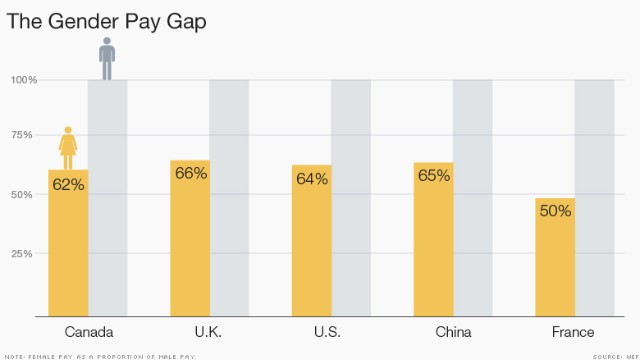In the years following the start of World War I, women joined the workforce in droves, replacing their husbands and fathers and brothers who had been sent off to fight. Women and men have historically been assigned different jobs, with women being ushered into the home to care for children, cooking, and cleaning, and men out of it. Instead, they were expected to work in fields and factories, intense, high-labor occupations.
While women have had payable employment rights for the past
hundred years, there is still obvious discrepancy in the pay rates between men
and women. An imbalance of funds between genders is not solely a western dilemma,
but one that has affected all corners of the world.
 |
| Women and nonbinary people are on strike in Iceland to demand equal pay. (npr.org) |
Iceland is one country that has accepted the reality of the
pay gap and has already made big strides towards gender equality. But, according
to Freyja Steingrímsdóttir, a spokeswoman for the Icelandic Federation of Public Workers, Iceland still has a long way to go. And although Iceland has
been notably recognized as a more progressive country, their wage gap is still at 21%. This number is significantly smaller compared to bigger
countries like the United States, but Italy and Belgium beat Iceland out
with even smaller gaps in pay.
Why must there be any difference in what someone’s labor is worth, especially when the difference is only gender?
Steingrímsdóttir, alongside other organizers might have had the same thought, so in October 2023, they had one simple request: “Women: Take the day off”.A strike was organized to bring awareness to gender issues,
and women and nonbinary people were urged to stop working completely. And
without these populations coming in to work and contributing to their communities,
the day of the strike seemed to fall apart completely. See, without women and
non-binary people working, businesses were forced to close, schools were not able to
operate since most teachers were women, and funnily enough, dishes went unwashed,
and clothes unfolded. If this were an everyday scenario, where women refused to
work, including household care, the entire way that society operates would
drastically change. So, if these people are so important to the advancement in
society, it is only just to ensure they are provided with fair wages for their
work. Or, at the very least, the same wage that the men in their country are
earning for the same amount of work.
 |
| The wage gap in 2015. In the US, women make about 82 cents for every dollar a man earns. (money.cnn.com) |
The strike did help in bringing awareness for gender
equality and a need for a narrower wage gap, but the road towards equality is
long. Iceland recognizing and even encouraging a strike demanding equal pay is
a move in the right direction, but programs to ensure equality between gender
in the workforce are more beneficial to everyone. But even Icelandic Prime Minister Katrín Jakobsdóttir seems to agree that advocacy and action are the beginning of social revolutions, since she enjoyed a day off during the strike too.
Comments
Post a Comment